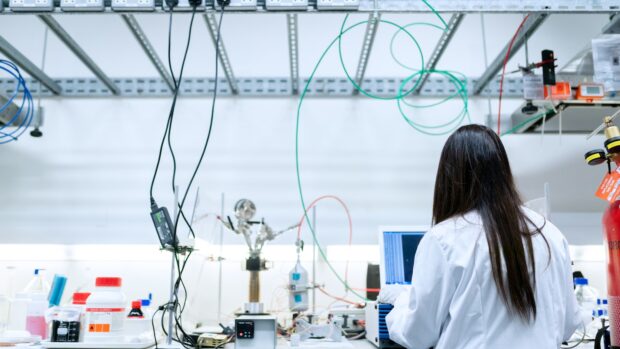Insilico Medicine, a biotech firm based in Hong Kong, has successfully developed the world’s first fully AI-generated drug, which is set to enter clinical trials with human patients next week. Known as INS018_055, this groundbreaking drug aims to address the treatment of idiopathic pulmonary fibrosis, a condition that affects approximately 100,000 individuals in the US and can be fatal within a span of two to five years. While artificial intelligence has been widely used for tasks such as generating photos, text, and other media, Insilico’s achievement marks a significant milestone as it demonstrates the potential of AI in the creation of innovative medicines. This development opens doors to the possibility of effectively treating diseases that were previously considered incurable, thereby potentially revolutionizing healthcare worldwide. In fact, it is not far-fetched to imagine that doctors may soon prescribe AI-generated treatments to their patients. In this article, we will delve into the details of Insilico’s AI-generated drug and provide insights from the researchers involved in this remarkable breakthrough.
To develop its AI-generated drug, Insilico Medicine employed a sophisticated artificial intelligence software suite called Pharma.AI. This suite consists of three AI programs: PandaOmics, Chemistry42, and InClinico. PandaOmics identifies the specific components of a virus that a drug should target, while Chemistry42 designs novel drug compounds aimed at these targets. Additionally, InClinico predicts the success rate of clinical trials and identifies potential issues in trial design. It is worth noting that Insilico Medicine is a participant in NVIDIA Inception, a startup accelerator program by the graphics card company NVIDIA. NVIDIA has further elaborated on Insilico’s breakthrough, stating that the startup utilized Pharma.AI to design and synthesize approximately 80 molecules. The process of identifying targets and determining a promising drug candidate spanned over 18 months and resulted in “unprecedented success rates for preclinical drug candidates.” Insilico Medicine plans to conduct Phase 2 clinical trials for its AI-generated drug, targeting several hundred patients with idiopathic pulmonary fibrosis in the US and China. According to CNBC, these trials will be conducted in a randomized, double-blind, placebo-controlled manner over a period of 12 weeks in China, with the testing population expanding to include 60 subjects across 40 locations in the US and China.
If the Phase 2 study proves successful, Insilico Medicine will proceed to conduct a larger Phase 3 study involving hundreds of patients. Alex Zhavoronkov, the founder and CEO of Insilico Medicine, expressed his expectations, stating that the company anticipates results from the ongoing Phase 2 trial to be available next year. However, he acknowledged the challenges in predicting the timeline for subsequent phases due to the rarity of the disease and the need for specific criteria in selecting patients. Nonetheless, he expressed optimism, affirming that the drug is on track to be ready within the next few years.
Researchers involved in the development of this AI-generated drug shared their insights on the process. Zhavoronkov revealed that the journey towards creating the new drug for idiopathic pulmonary fibrosis began in 2020 with the goal of developing a “moonshot” drug that surpasses existing treatments. Current treatments primarily focus on slowing down the progression of the disease but may come with unwanted side effects. Insilico Medicine chose to focus on this particular medical condition due to its implications for aging. Zhavoronkov explained the company’s approach, stating, “When this company was launched, we were focused on algorithms, developing the technology that could discover and design new molecules… I never imagined in those early days that I would be taking my own AI drugs into clinical trials with patients. But we realized that in order to validate our AI platform, we needed to not only design a new drug for a new target but bring it into clinical trials to prove that our technology worked.” He further highlighted the significance of this achievement, stating that this AI-generated drug is the first of its kind to reach Phase 2 trials with patients, featuring both a novel AI-discovered target and a novel AI-generated design.
In conclusion, Insilico Medicine, a biotech company based in Hong Kong, is set to launch clinical trials for the world’s first fully AI-generated drug. This groundbreaking development holds promise for effectively treating patients with idiopathic pulmonary fibrosis. As Microsoft co-founder Bill Gates rightly predicted, the era of AI has commenced, and it is making notable strides in various sectors, particularly education and healthcare. Insilico Medicine and other companies are actively working towards the development of AI-generated medicines, which may soon be accessible at local pharmacies. Stay informed about the latest digital trends and insights at Inquirer Tech.
Denial of responsibility! VigourTimes is an automatic aggregator of Global media. In each content, the hyperlink to the primary source is specified. All trademarks belong to their rightful owners, and all materials to their authors. For any complaint, please reach us at – [email protected]. We will take necessary action within 24 hours.


